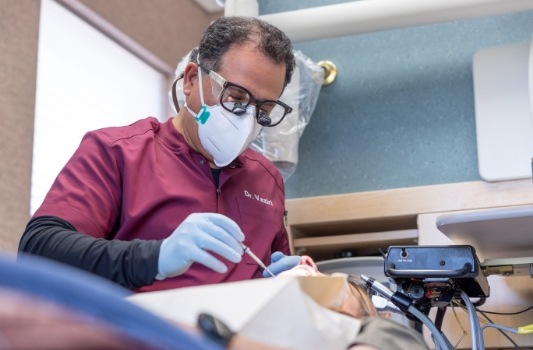Root Canal Surgery – Lorain, OH
Removing Infection from Around the Root Tips and the Surrounding Area
Sometimes after root canal therapy, there may still be some inflamed gum tissue around the roots of the tooth. This is typically a sign that an infection might still be present, and action will need to be taken if you want to avoid an extraction. In some instances conventional retreatment is not the best option especially if previous attempts have not worked. In such cases, Dr. Vaziri may recommend having root canal surgery in Lorain performed. Please call our dental office today if you would like to learn more about this treatment and why it might be critical for protecting your smile.
Why Choose Parkway Endodontics of Lorain for Root Canal Surgery?
- Thorough, Detail-Oriented Endodontists
- Trusted by Middleburg Heights Since 2004
- We Think of Patients as Partners
What is Root Canal Surgery?
While root canal therapy deals with the inner chamber of the tooth, root canal surgery specifically focuses on the treatment of the tip of the roots. This may be necessary if a previously root canal treated tooth becomes re-infected. Possible reasons may be recurrent decay or a crack amongst others. Root canal surgery is also a viable option when a previously root canal treated tooth can not be conventionally treated due to an obstruction in the canals or in case of a bran new restoration that needs to be preserved.
The Root Canal Surgery Process
The area around the affected tooth will be numbed so that there will be no pain during the procedure. A small incision will be made in the gums so that the tips of the roots can be accessed. A small section of the root will be removed, the remaining part will be prepared and sealed with a filling. Any infected tissue around the roots will be removed. Stitches will be used to close the gums so that they can heal.
What Happens After My Root Canal Surgery?

The recovery to this procedure is generally quick. Some discomfort and swelling might occur after your root canal surgery. Use ice packs in 20-minute intervals and take over-the-counter pain medication if you need to. Eat soft foods while you’re recovering and avoid chewing with the part of your mouth where the surgery was performed. Physical exertion can worsen your swelling, so it’s best to take it easy during the initial stages of your recovery. Protect your mouth from infection by gargling with salt water after each meal.
Root Canal Surgery FAQs
When is Root Canal Surgery Necessary?
Root canal surgery is only necessary when an initial root canal therapy treatment fails. Technically, this type of retreatment surgery is called an “apicoectomy.” Your first round of root canal therapy might have failed because your tooth became reinfected, or because curved or extra canals harbored dangerous bacteria.
To clarify, there are other types of root canal retreatment. What makes an apicoectomy different is that it’s more delicate and focuses on the very tip of the dental roots. It’s also ideal for patients with new restorations that must be handled carefully.
Are There Risks to Having Root Canal Surgery?
Apicoectomies are very safe treatments with a 95% success rate. However, there is a small risk of developing another infection or nerve damage. It’s also possible for an apicoectomy to fail. Since this type of surgery is often the last line of defense for a troubled tooth, failure often means the tooth has to be extracted.
It’s important to be aware of these possibilities but know that apicoectomies have a reliable track record for success.
Will Dental Insurance Cover My Root Canal Surgery?
Most likely. Every plan is different, so it’s always a good idea to double-check, but generally, apicoectomies are at least partially covered by dental insurance.
Our team is always happy to help with your dental insurance benefits. If you’re having trouble determining what is and isn’t covered, we’ll review the details of your plan carefully to make sure you’re saving as much money as possible. Don’t hesitate to ask us for assistance or for a breakdown of your benefits!
What Are the Benefits of Root Canal Surgery?
Treating a reinfected tooth with an apicoectomy has many benefits, such as:
- Enabling you to keep your natural tooth structure
- Avoiding the need for extraction and tooth replacement
- Minimally invasive procedure
- Reliable rate of success
- Experiencing minimal discomfort – note that we can offer dental sedation for patients with a history of sensitivity or anxiety!
- Short recovery time in most cases
What Are the Signs I Might Need an Apicoectomy?
Root canal surgery is most often needed when a previously treated tooth becomes reinfected. As such, you’ll likely experience symptoms related to infection. For example:
- Pain that lasts longer than one week
- Pain that is severe and distracting
- A noticeable bump or “pimple” just above your tooth
- A visual oral exam or X-ray shows root or bone damage




